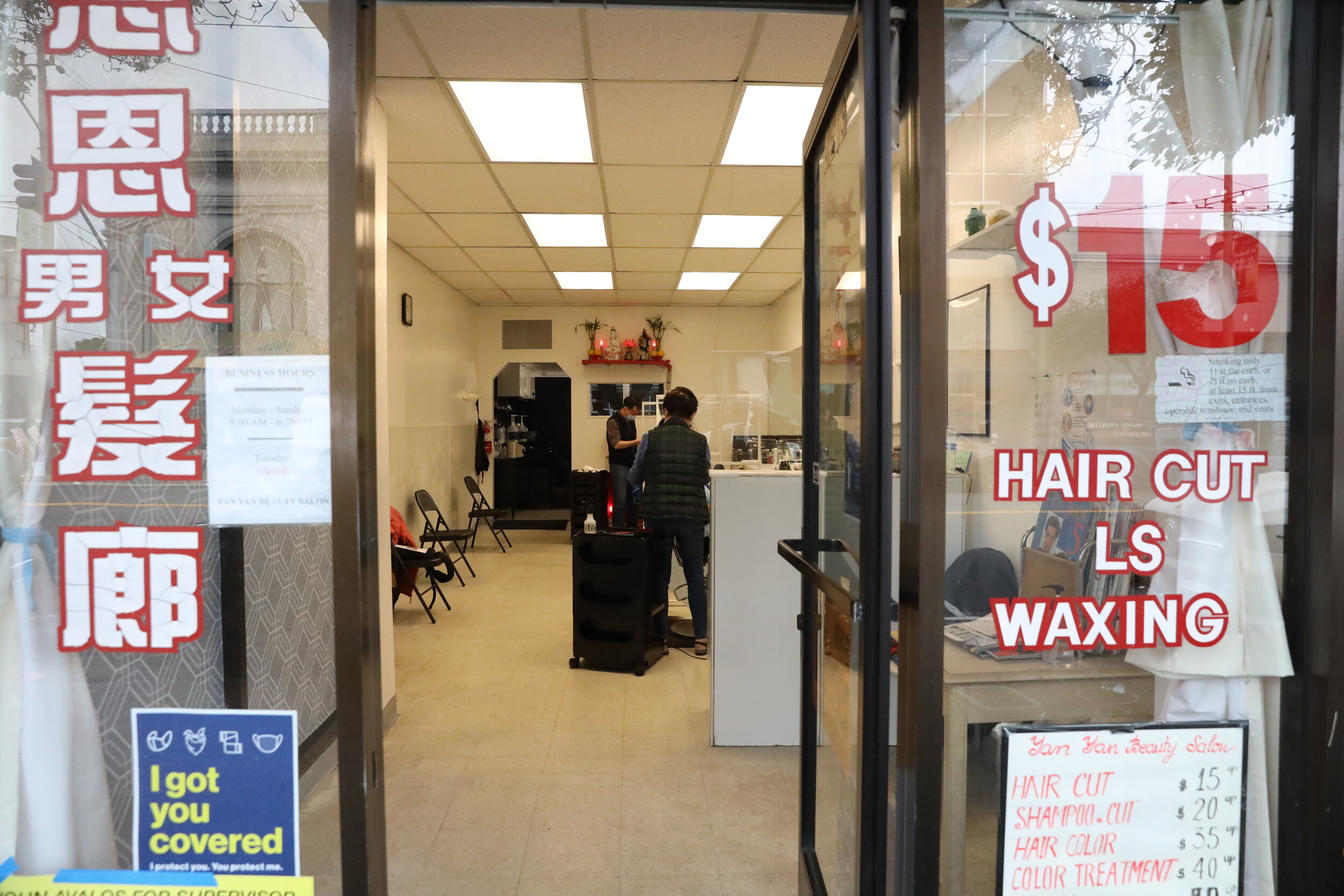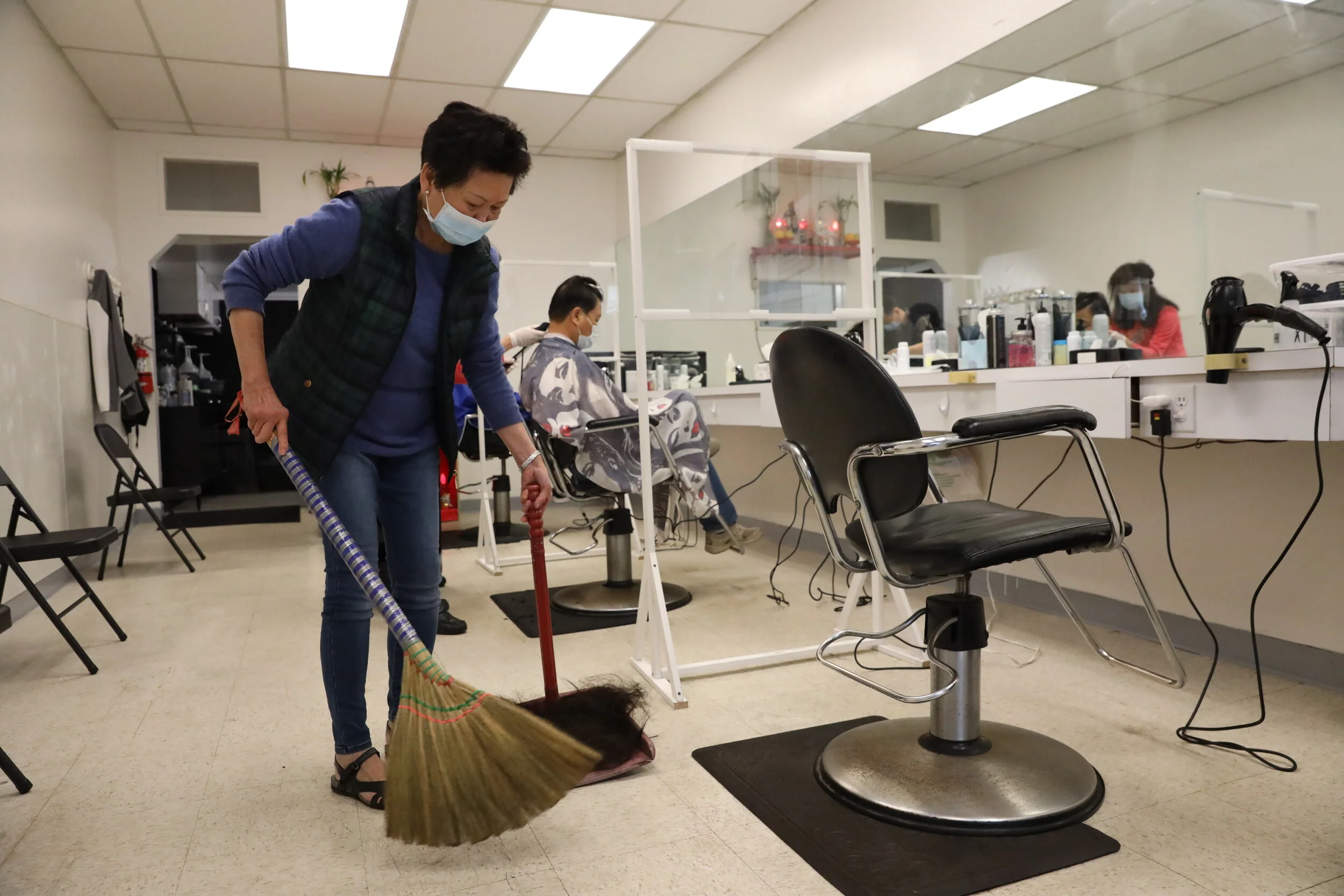Yan Yan Beauty Salon: Conversation with Anh Huynh
Anh Huynh of Yan Yan Beauty Salon cutting artist and collaborator Vida Kuang’s hair, 4619 Mission Street, Excelsior district, from the series My Ancestors Followed Me Here, 2020; inkjet print; courtesy the artist; © Erina Alejo
Vida and I combed through the Excelsior district
Note by Erina Alejo:
for a shopkeeper open to being interviewed. Anh Huynh and her stylists at Yan Yan Beauty Salon had just reopened after San Francisco’s first shelter-in-place mandate. Each time, Vida and I got haircuts from Anh and learned more about her story, especially through Vida’s authentic, warm, and humanistic approach, from their years of working as an artist and organizer throughout the Bay Area. It turns out that Anh knew my family’s regular stylist, Kimberly, whose salon, a few blocks down, closed for good earlier in the pandemic. My brother and mom started getting haircuts from Yan Yan after that. The staff endured a second recent lockdown and has since reopened Yan Yan. We look forward to continue supporting their business.
Interview conducted by Vida Kuang on October 7, 2020. Part of My Ancestors Followed Me Here, created for Bay Area Walls, a commission series initiated by the San Francisco Museum of Modern Art in 2020. This interview was transcribed by Vida Kuang and has been edited for clarity. A downloadable PDF of this transcript is available on SFMOMA. An excerpt is also published in the newspaper format of this project, designed by Jerlyn Jareunpoon Phillips. Photos by Alejo.
Yan Yan Beauty Salon: Conversation with Anh Huynh
By Vida Kuang
October 7, 2020
4619 Mission St., Excelsior District
Vida Kuang: 好似好多通常喺呢度做髮廊嘅係越南華僑,係咪呀 ?
I notice a lot of Chinese Vietnamese immigrants tend to work in beauty salons, is that right?
Anh Huynh: 係啩。
I think so [chuckles].
VK: 咁點解有咁多越南華僑開髮廊啊 ?
Why do you think so many Chinese Vietnamese immigrants tend to open hair salons?
AH: 你知嗎,我哋越南人多數肯做,肯捱。剪髮呀同做手甲呀。You know, as Vietnamese people, many of us are willing to work, willing to endure.,including doing jobs like hair, doing nails . . .
VK: 做呢啲工你係咪喺越南識或者喺呢度學㗎 ?
Did you learn this work in Vietnam or here?
AH: 唔係呀,係呢度開始㗎。喺越南我哋多數做買賣。
No, I started when I came here. Back in Vietnam, we sold things in the market.
VK: 你喺越南嗰陣時呢,後生嗰陣時做咩工㗎 ?
What did you do in Vietnam when you were younger?
AH: 我讀書囉,讀中文。嗰陣時生活好困難嘅。一家個個都要捱你知嗎。要出去賣嘢,個個都要做嘢㗎。我哋開舖頭賣麵,好似呢度大王開出嚟賣麵,賣大包,賣食咁樣囉。
I was in school and I studied Chinese. At the time, life was difficult. Life was . . . well, as a family, we all had to endure and struggle, you know. We all went out to sell things, we all worked to live. We opened a shop and sold noodles. Kind of like Good Orchard Bakery down the block here [in Excelsior]. We sold dai baos and noodles and other food.
VK: 你自己有冇喺嗰度做過工呀 ?
Did you work at the store too?
AH: 冇,我嘅父母做,我哋嗰陣時要返學,到大個咗先幫手。No, our parents worked the business. We helped, but were mostly in school. When we got older, we helped out more.
VK: 我喺呢度我係唐人埠長大。
You know, I grew up here in Chinatown.
AH: 哦你呀,哈哈。你過嚟好耐呀 ? 喺香港或大陸過嚟呀 ?
Oh, aiiiyyyaa! [laughs]. Did you come here a long time ago? From Hong Kong?
VK: 唔係,我喺呢度出世。媽媽爸爸台山人,喺中國台山來。No, I grew up here. My parents are Toisanese. From Toisan, China.
AH: 你媽媽幾好嗎?
Is your mom doing good?
VK: 都ok啦,而家做照顧老人。佢哋以前開咗間舖頭係唐人埠。佢哋退咗休而家冇開。做得好辛苦,我睇我爸爸媽媽啲手都唔滑嘅。
She’s okay. She’s working as an in-home care provider for the elderly right now. When we were little, my parents opened up a small grocery store. It was really hard on them. They retired from it. I look at my parents’ hands and they aren’t smooth.
AH: 好老了來美國,四十歲了。
[Laughs]. I came to the U.S. when I was pretty old, in my forties.
VK: 你之前喺越南做乜嘢工呀?
Back in Vietnam, what kind of work did you do?
AH: 我做酒店,打仗嗰陣時,好多美國人喺越南呀嘛。1966,62,63 嗰陣時。打仗好犀利呀你知嗎?
I worked at a hotel back home. At the time (in the early to mid-1960s), there were a lot of Americans coming to Vietnam because of the war. The war was going on and it was very intense, you know.
VK: 嗰陣時呢係點樣㗎 ?
What was it like then?
AH: 嘩1963年打仗好驚呀。打到走啊。
The year 1963 was very frightening. Warfare was loud and everyone wanted to leave.
VK: 你當時係咪仲住喺胡志明城 ?
Were you still living in Ho Chi Minh City then?
AH: 係呀,仲住喺胡志明,因為仲未解放吖嘛。
Yeah, I was still there. The Liberation of Saigon hadn’t happened yet.
VK: 係唔係一路打仗你繼續喺酒店做工呀 ?
While the war was happening, were you still working at the hotel?
AH: 最尾都冇,1972年退曬返嚟呢度。我做執房。
I stopped working there after a while. Around 1972, the American troops began leaving and returning here.
VK: 咁嗰陣時你一路執房,嗰度一路打仗 ?
Were you housekeeping while the war was happening?
AH: 一路執房一路打仗。不過佢哋打得很遠,唔係好近胡志明市。後尾喺 75年佢哋走入去胡志明市,咁個個都走曬喎。嗰陣時美國退曬我哋冇做呀。
Yes, I was working as a hotel housekeeper as the war was going on. But they were fighting close by until 1975, when they attacked Ho Chi Minh City. Then, everyone left. When the Americans left, we had to stop working.
VK: 你嗰陣時驚嗎 ?
Were you scared then?
AH: 嗰陣時細個唔驚㗎。乜都唔驚。
I was young then; I wasn’t scared of anything [laughs].
VK: 乜都唔驚 ?
Not scared at all?
AH: 係呀細個唔驚。嗰陣時好後生呀嘛。廿零歲邊度驚呢。Yeah, I was fearless when I was young. I was in my twenties and wasn’t scared of the world.
VK: 你嬲唔嬲美國呀 ?
Were you ever angry at the U.S.?
AH: 唔係呀。
No, not really.
VK: 我覺得如果係我呢我會好嬲,我會好嬲呢啲外國人侵入我個國家打我哋。
I think if it were me, I’d be very angry at these foreigners for coming into my home, attacking my people.
AH: 冇辦法啦,呢啲係政府啲嘢係咪呀 ?
[Chuckles]. Well, what can you do? These matters are between governments, right?
VK: Mhmm . . .
AH: 以前細個好開心㗎,乜都唔識。
When I was younger, I was very happy. I didn’t know anything. I was very carefree.
VK: 你可唔可以講多啲你細個嗰陣時點樣呀 ? 我而家29歲, 你29歲嗰陣時係點㗎 ?
Can you tell me more about when you were younger? I’m twenty-nine now. What was it like when you were twenty-nine?
AH: 29歲我啱啱結婚。解放之後先結婚。
At twenty-nine, I was just married. I got married just after Liberation.
VK: 你後生嗰陣時有乜嘢夢想呀 ?
When you were younger, what kinds of dreams did you have?
AH: 冇乜嘢夢想呀。一味返工。休息嗰陣時揸車同朋友去食野餐呀,游水呀。嗰陣時後生好開心㗎。好似你咁而家後生幾開心。When I was younger . . . I didn’t have many dreams. I worked a lot. When we had time off, we rode on scooters and went out with friends to the night markets, or we went swimming. When I was younger, I was really happy. Like you right now—to be young and happy. Where did you go before the pandemic?
VK: 你記得你第一個美國餐係乜嘢嗎?
Do you remember your first meal in the U.S.?
AH: 初初我呢我食中國粉麵呀。嘩,冇嘢㗎 ! 淨係蔥咋,啲麵淨係蔥花㗎咋。佢冇乜味道添。淨係啲蝦米味。食到以為好好食。原來美國啲粉麵好難食。食到返屋企打冷震。
When we first came, we got Chinese noodle soup. There wasn’t anything in there! Just—[laughs] just green onions! No real flavor, just dried shrimp flavor. When we first ate American noodles, we thought they weren’t bad, but afterwards we were quivering from just the thought of it.
VK: 哈哈!
[Laughs].
AH: 越南人呢肯做肯捱。又唔怕啦渣。自己做,自己開舖頭。我哋啲越南人多數會自己開舖頭。唔想幫人打工。自己搵錢。
Vietnamese people, we’re willing to work, willing to endure. We don’t mind getting down and dirty. We want to work for ourselves. I can have my own freedom when I open my own business. I work for no one else but myself.










